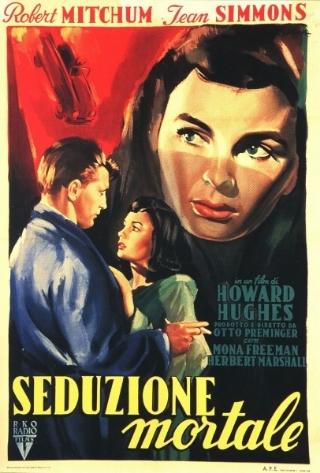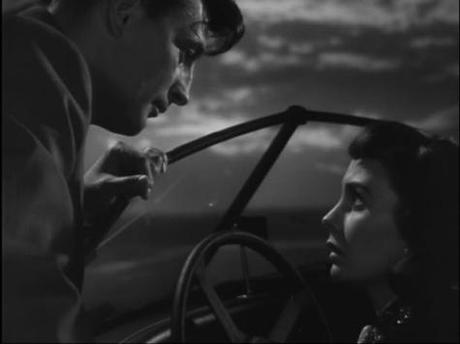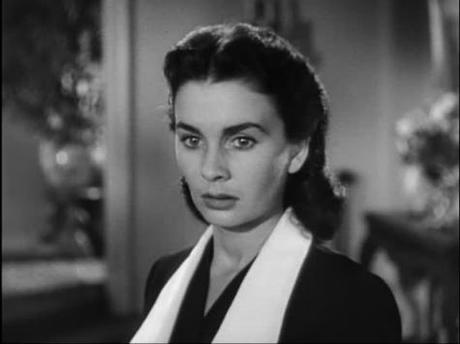
I don’t pretend to know what goes on behind that pretty little face of yours; I don’t want to. But I learned one thing very early. Never be the innocent bystander; that’s the guy that always gets hurt.
The femme fatale, the deadly woman, the one whose duplicity, self-interest and machinations lure the protagonist towards danger and doom is widely considered to be a staple of film noir. I’ve even seen some argue that such a figure is an essential element of this style of filmmaking, though I wouldn’t go as far as that myself. And yet she is an important figure, one who has achieved iconic status and entered the everyday vocabulary of even casual film fans. There have been outstanding examples of the femme fatale committed to film: Barbara Stanwyck in Double Indemnity, Jane Greer in Out of the Past, Ava Gardner in The Killers and Yvonne De Carlo in Criss Cross to name just a handful of notables. Those women were all devious, alluring and lethal, and all of them were entirely conscious of their inherent malice. But what of those characters who fall almost accidentally into the category of the fatal woman? What if a woman, by her actions, becomes a femme fatale while her motivations and psychological profile are wholly different? As far as I can see, Angel Face (1952) provides an example of just such a case – a dangerously attractive female of deadly intent who’s also a mass of complexities and contradictions.
An ambulance is called to a Beverly Hills mansion late at night. Catherine Tremayne (Barbara O’Neil), the owner, has almost died in a gas-filled bedroom. It might have been an attempted suicide or an attempted murder, but in the end everyone seems satisfied that it was probably just one of those unfortunate accidents that occur in the home. With the emergency apparently over and people about to head home, Frank Jessup (Robert Mitchum), one of the ambulance drivers, pauses in the hallway, his attention caught by the figure of a girl at the piano in the drawing-room. This is Diane Tremayne (Jean Simmons), the owner’s stepdaughter. As Frank stops to offer a word of reassurance, we get a glimpse of the fragile instability of the girl; she’s edgy and prone to hysterics. But more than that, there’s an impulsive, neurotic side to her. The former is immediately apparent when she follows Frank and essentially picks him up as he ends his shift. The latter, the neurosis, is revealed more gradually as she sets about seducing Frank and drawing him ever deeper into the complicated affairs of the Tremayne household. Diane’s father (Herbert Marshall) is – or rather was – a celebrated writer who has let his talents go to seed, mostly as a result of the pampered lifestyle brought on by a comfortable marriage. In Diane’s eyes her father is, and always will be, her whole world. As such, Catherine is the enemy, the cause of her father’s creative decline and her own consequent dissatisfaction. Almost every noir scenario revolves around the weakness of the protagonists, often their inability to accept responsibility for their own situation in life. And so it is with Diane, everything could be hauled back onto an even keel if only Catherine weren’t there: her father would recover his desire to write and she would be free to make a life with Frank. However, fate has an unfortunate tendency to throw a big awkward spanner in the works and even the best laid plans can go disastrously awry.

It’s very often the case that the most compelling movies had a troubled production history. I don’t know whether it’s down to behind the scenes tensions lending an air of urgency to events on the screen or the people involved becoming more focused on their task. Either way, there are plenty of examples of a poisonous atmosphere bringing about a fine movie. With Howard Hughes in charge of RKO there always seemed to be ample opportunity for discord on the set. Angel Face was essentially a film born of pettiness. Hughes wanted Jean Simmons but she’d recently married Stewart Granger and was having none of it. The upshot of all this was Simmons struck a deal to make a handful of films quickly and thus get out of an unpleasant contract. Her dislike of Hughes and his unwelcome attention was so great that she even chopped off her hair crudely and so was forced to play her role in the film with a slightly odd-looking wig. On top of all that, there were issues with director Otto Preminger. Simmons’ first scene in the picture involved her descending into hysterics and Mitchum bringing her out of it with the application of that cinematic staple, the open-handed slap. Well Preminger apparently didn’t like the way Mitchum pulled the blow, claiming it was going to look phony in close-up. So he had him do it again, and again, and again. With Simmons in tears and Preminger relentless, Mitchum apparently turned on the director and either gave him some of the same treatment or threatened to do so – for more on the tumultuous production, see Robert Mitchum: Baby, I Don’t Care by Lee Server pp 288-291. Maybe nobody was having a particularly good time on the set but the end result was the taut, highly strung atmosphere of the Tremayne house feels completely authentic.

Angel Face is Jean Simmons’ picture all the way, and gave her one of her most interesting and complex roles. As I said in the introduction, she’s unquestionably the femme fatale of the film, her actions causing chaos, death and misery. Yet she brings an emotional immaturity and insecurity to the part that sets Diane Tremayne apart from the classic interpretation of the femme fatale. If her behavior is seen as selfish, then it’s only a childish form of selfishness. Her hatred for her stepmother only exists as a result of her love and devotion for her father, and her ultimate destruction of Frank is an unwanted side-effect – there’s no malicious calculation involved. Where Simmons really excelled was in her portrayal of the brittleness of the character; her every gesture is suggestive of a young woman tiptoeing around the rim of a moral abyss. Mitchum of course was a past master by this stage at playing the kind of weary types who had bid farewell to hope long ago. The deceptive sleepiness and detachment he’s often accused of perfectly suits the character here – a disillusioned veteran half adrift in a world that he only thinks he’s got a handle on. The supporting cast all do fine work too, the highlights being: Herbert Marshall’s dissipated joviality, Barbara O’Neil’s cool take on the society matron, and Leon Ames as the twisty, unctuous lawyer.
Angel Face is available on DVD via Warner Brothers in the US, and the disc sports a very nice transfer. Everything’s crisp and clean and Harry Stradling’s cinematography always looks good. The DVD also carries a commentary by noir specialist Eddie Muller. Otto Preminger’s noir films are all worthwhile, classy efforts. This one may have had something of a sour background but what we see on screen is hard to fault. For me, the performance of Jean Simmons in a difficult and demanding role is the best thing about it all, but that’s just the icing on the cake. I reckon it’s a must see film noir.
